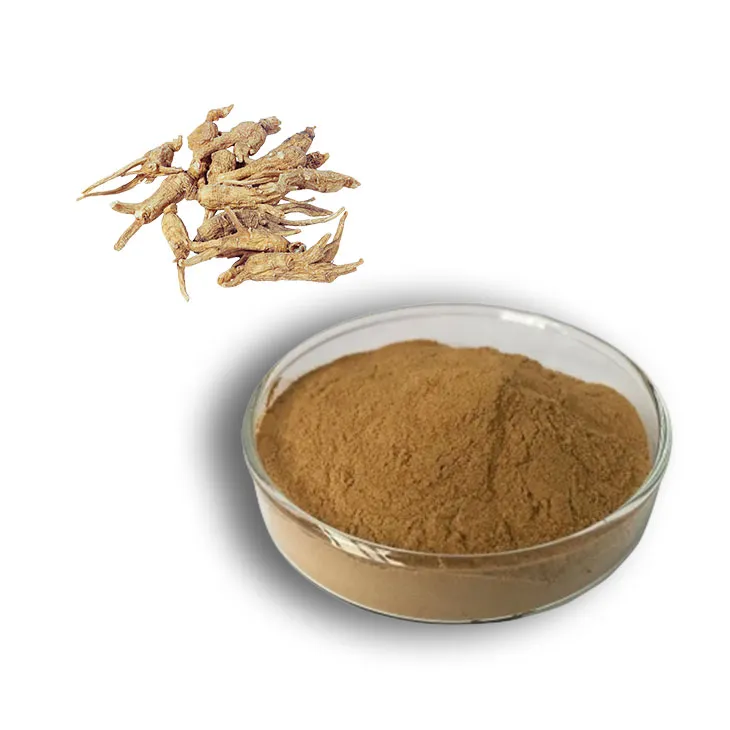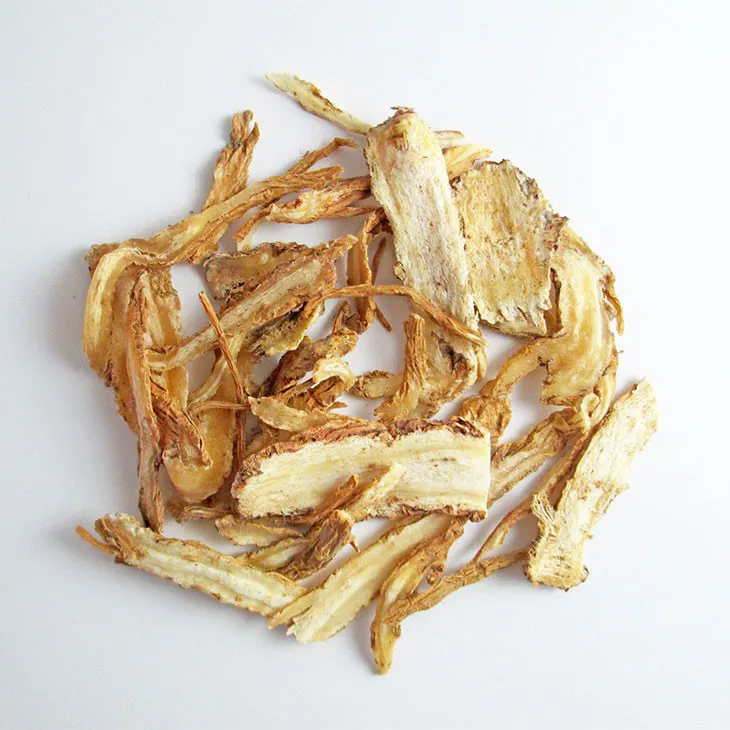- 0086-571-85302990
- sales@greenskybio.com
Components of Angelica sinensis extract in fertilizers and feeds.
2024-11-29

1. Introduction
Angelica, a well - known plant in traditional medicine, has been increasingly studied for its potential applications in non - medicinal fields. Angelica extract, which is obtained through various extraction methods, contains a rich array of nutrients and bioactive substances. These components make it a promising candidate for use in fertilizers and feed components.

2. Angelica Extract in Fertilizers
2.1 Nutrient Composition of Angelica Extract
Angelica extract is rich in essential nutrients. It contains significant amounts of nitrogen, phosphorus, and potassium (NPK), which are the primary macronutrients required for plant growth. For example, nitrogen is crucial for the synthesis of proteins and chlorophyll in plants. Phosphorus is involved in energy transfer and storage, as well as in DNA and RNA synthesis. Potassium helps in regulating plant water balance, enzyme activation, and photosynthesis.
In addition to NPK, angelica extract also contains micronutrients such as iron, zinc, manganese, and copper. These micronutrients are required in small amounts but are essential for various physiological processes in plants, including enzyme catalysis and electron transfer reactions.
2.2 Effects on Soil Fertility
When added to the soil, angelica extract can have several positive effects on soil fertility.
- Improvement of Soil Structure: The organic matter in the angelica extract can enhance soil aggregation. This helps in creating a more porous soil structure, which allows for better air and water circulation in the soil. Good soil structure is essential for root growth and the survival of soil organisms.
- Enhancement of Microbial Activity: The nutrients and bioactive substances in the extract can stimulate the growth and activity of soil microorganisms. These microorganisms play a vital role in nutrient cycling, decomposition of organic matter, and soil health maintenance. For example, certain bacteria can fix nitrogen from the atmosphere, making it available for plant uptake.
- Increased Nutrient Availability: The extract can chelate or bind with soil nutrients, preventing them from being leached away. It can also help in releasing nutrients that are bound to soil particles, making them more accessible to plants.
2.3 Impact on Plant Growth
Angelica extract has a significant impact on plant growth.
- Germination: It can enhance seed germination rates. The nutrients and growth - promoting substances in the extract provide the necessary energy and signals for the seeds to start the germination process. For instance, some bioactive compounds may stimulate the production of enzymes that break down stored food in the seed.
- Vegetative Growth: During the vegetative growth stage, plants treated with angelica extract often show increased growth in terms of shoot length, leaf number, and leaf area. This is due to the availability of nutrients and the positive influence on plant hormones. The extract may regulate the levels of auxins, cytokinins, and gibberellins, which are hormones involved in cell division, elongation, and differentiation.
- Reproductive Growth: In the reproductive stage, the use of angelica extract can lead to improved flower formation, pollination, and fruit set. It can also enhance the quality of fruits and seeds, such as increasing their size, nutrient content, and storability.
2.4 Application Methods of Angelica Extract in Fertilizers
There are different ways to apply angelica extract in fertilizers.
- Foliar Spray: This method involves spraying a diluted solution of angelica extract directly onto the leaves of plants. The advantage of foliar spray is that the nutrients and bioactive substances can be quickly absorbed by the leaves and transported to other parts of the plant. However, it is important to choose the right concentration and spraying time to avoid leaf burn.
- Soil Drench: In soil drench, the angelica extract solution is poured onto the soil around the base of the plants. This allows the roots to absorb the nutrients gradually. Soil drench is more suitable for long - term nutrient supply and for plants with deep root systems.
- Compost Amendment: Angelica extract can be added to compost during the composting process. This enriches the compost with additional nutrients and bioactive substances, and the resulting compost can be used as a high - quality organic fertilizer.

3. Angelica Extract in Feed Components
3.1 Nutritional Value of Angelica Extract for Livestock
Angelica extract offers several nutritional benefits to livestock.
- Rich in Vitamins and Minerals: It contains vitamins such as vitamin A, vitamin C, and vitamin E, which are important for the immune system, reproduction, and antioxidant protection in animals. The minerals present in the extract, including calcium, magnesium, and selenium, are essential for bone development, muscle function, and enzyme activity.
- Source of Amino Acids: Angelica extract also provides a source of amino acids, which are the building blocks of proteins. Amino acids are necessary for growth, tissue repair, and milk production in livestock.
3.2 Health - Promoting Effects on Livestock
The bioactive substances in angelica extract have various health - promoting effects on livestock.
- Immune System Enhancement: Some compounds in the extract can stimulate the immune system of animals, making them more resistant to diseases. For example, they may increase the production of antibodies and enhance the activity of immune cells.
- Digestive Health Improvement: Angelica extract can improve the digestive function of livestock. It may help in regulating the gut microbiota, increasing the production of digestive enzymes, and reducing the incidence of digestive disorders such as diarrhea.
- Stress Reduction: Livestock are often exposed to various stressors, such as environmental changes and handling. The bioactive substances in the extract can help in reducing stress in animals by modulating the stress response hormones.
3.3 Feed Formulation with Angelica Extract
When formulating feeds with angelica extract, several factors need to be considered.
- Dosage: The appropriate dosage of angelica extract needs to be determined based on the type of livestock, their age, and production stage. Too high a dosage may cause adverse effects, while too low a dosage may not provide the desired benefits.
- Compatibility with Other Feed Ingredients: Angelica extract should be compatible with other feed ingredients in terms of nutrient balance and palatability. For example, it should not interfere with the absorption of other nutrients or cause a decrease in feed intake.
- Processing and Storage: The feed formulation process should ensure that the bioactive substances in the angelica extract are not destroyed during processing and storage. Appropriate processing methods and storage conditions need to be selected to maintain the quality of the feed.

4. Challenges and Future Directions
4.1 Challenges in the Use of Angelica Extract
Despite its potential, there are some challenges in the use of angelica extract in fertilizers and feed components.
- Standardization of Extract Quality: There is currently a lack of standardized methods for the production and quality control of angelica extract. Different extraction methods may result in extracts with varying compositions and potencies, which can affect their performance in fertilizers and feeds.
- Cost - Effectiveness: The production cost of angelica extract may be relatively high, especially for large - scale applications in agriculture and livestock. Finding cost - effective extraction methods and production processes is crucial for its widespread use.
- Regulatory Approval: In some regions, there may be regulatory requirements for the use of new feed and fertilizer components. Obtaining regulatory approval for angelica extract can be a time - consuming and complex process.
4.2 Future Directions
There are several future directions for the research and development of angelica extract in fertilizers and feed components.
- Research on Optimal Application Conditions: Further research is needed to determine the optimal application conditions of angelica extract in different types of soils, plants, and livestock. This includes studying the interaction between the extract and other agricultural inputs.
- Development of New Extraction Technologies: New extraction technologies need to be developed to improve the efficiency and quality of angelica extract production. This may involve the use of advanced separation techniques and biotechnology.
- Exploration of Synergistic Effects: Investigating the synergistic effects between angelica extract and other natural or synthetic substances can lead to the development of more effective fertilizers and feed additives.
5. Conclusion
Angelica extract, with its rich nutrient content and bioactive substances, has great potential in both the fertilizer and feed sectors. It can enhance soil fertility, promote plant growth, and offer various health benefits to livestock. However, to fully realize its potential, challenges such as standardization, cost - effectiveness, and regulatory approval need to be addressed. Future research should focus on optimizing its application, developing new extraction technologies, and exploring synergistic effects. With further development, angelica extract could become an important component in sustainable agriculture and livestock production.
FAQ:
What are the main components of Angelica sinensis extract?
Angelica sinensis extract contains a variety of components. It has nutrients such as vitamins, minerals. Also, it contains bioactive substances like flavonoids, polysaccharides which contribute to its various functions in fertilizers and feeds.
How does Angelica sinensis extract enhance soil fertility in fertilizers?
The bioactive substances in Angelica sinensis extract can improve soil structure. For example, polysaccharides may help bind soil particles together, increasing soil porosity. It can also supply some essential nutrients that are beneficial for the growth of soil microorganisms, which in turn enhance the overall soil fertility.
What benefits can Angelica sinensis extract bring to plant growth in fertilizers?
Angelica sinensis extract can stimulate plant root development. The nutrients and bioactive components can be absorbed by plants, promoting their growth. It may also enhance the plant's resistance to environmental stresses such as drought and disease, leading to healthier and more productive plants.
What are the advantages of using Angelica sinensis extract in feeds for livestock?
When used in feeds, Angelica sinensis extract can improve the immune system of livestock. It may enhance digestion by promoting the growth of beneficial gut microbiota. Additionally, it can contribute to better meat quality and milk production in animals.
How is Angelica sinensis extract processed for use in fertilizers and feeds?
Typically, Angelica sinensis is first harvested and then undergoes extraction processes. This may involve solvent extraction methods to obtain the active components. The extract is then formulated into fertilizers or feeds, often after purification and concentration steps to ensure the appropriate dosage and effectiveness.
Related literature
- The Nutritional Components and Bioactive Substances in Angelica sinensis"
- "Angelica sinensis Extract: A Promising Additive in Agricultural Fertilizers"
- "Beneficial Effects of Angelica sinensis in Livestock Feeds"
- ▶ Hesperidin
- ▶ citrus bioflavonoids
- ▶ plant extract
- ▶ lycopene
- ▶ Diosmin
- ▶ Grape seed extract
- ▶ Sea buckthorn Juice Powder
- ▶ Beetroot powder
- ▶ Hops Extract
- ▶ Artichoke Extract
- ▶ Reishi mushroom extract
- ▶ Astaxanthin
- ▶ Green Tea Extract
- ▶ Curcumin Extract
- ▶ Horse Chestnut Extract
- ▶ Other Problems
- ▶ Boswellia Serrata Extract
- ▶ Resveratrol Extract
- ▶ Marigold Extract
- ▶ Grape Leaf Extract
- ▶ blog3
- ▶ blog4
-
The best lemon juice powder in nature.
2024-11-29
-
Organic Vitamin K2 Powder Suppliers
2024-11-29
-
Bulk purchase of L - tyrosine.
2024-11-29
-
Vitamin K2 Manufacturers
2024-11-29
-
100% Pure Natural Rutin.
2024-11-29
-
Chinese Citrus Bioflavonoid Suppliers.
2024-11-29
-
Beetroot Powder
2024-11-29
-
Diosmin
2024-11-29
-
Red Wine Extract
2024-11-29
-
Eucommia Ulmoides Extract
2024-11-29
-
Tormentil Extract
2024-11-29
-
Ivy Extract
2024-11-29
-
Green coffee bean Extract
2024-11-29
-
Red Vine Extract
2024-11-29
-
Angelica sinensis extract
2024-11-29
-
Elderberry Extract
2024-11-29




















